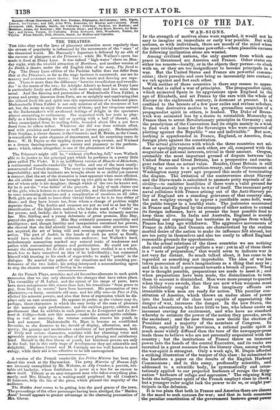The Princess's might still be, "without o'erflowing, full," were Wallack
able to do justice to the principal part which he performs in a pretty little piece called The Violet. It is an indifferent version of Blanche et Blanchette, a sentimental comedie-vandeville by Scribe, and one of the most neatly- constructed of French dramas. The story is simple and touching despite its improbability, and the incidents are brought about in so skilful yet natural a manner, that the art of the dramatist is least apparent when most efficient. An old soldier named Andre has brought up two girls as his own children, one of whom only is his daughter; though which of the two he knows not, for he is not the "wise father" of the proverb. A lady of rank claims one of the girls, who is heiress to a fortune and title; and this incident gives rise to some interesting situations and a complication of emotions on all sides. Both girls are as loath to leave their virtual father as he is to lose either of them; and they have lovers too, from whom a change of position might separate them. The doubts and suspense are put an end to at last by the identification of the high-born maiden, who has the mark of a "violet" on her person; and, luckily, she is beloved by a duke, who instantly marries her. Mrs. Stirling, and a young debutante of great promise, Miss May, played the girls very nicely. Miss May evidently possesses sensibility and intelligence; and, though timidity and inexperience restrained her powers, the showed that she had already learned, what some older actresses have not acquired, the art of being still and seeming engrossed by the stage action. The part of Andre, in the hands of such an artist as Bouffe, would have melted the most obdurate audience; but Wallack's hard, melodramatic mannerism masked any natural traits of tenderness and pathos with conventional grimace and gesticulation. He could not per- sonate the character; for he did not appear to have studied it as a whole, much less to have conceived an idea of its individuality; but contented himself with trusting to his stock of stage-tricks to make "points" in the dialogue. He marred the pathos of the situations and the touching per- formance of the two ladies; his acting interposed a nonconducting agent to stop the electric current of feeling in its course.


























 Previous page
Previous page